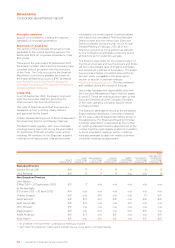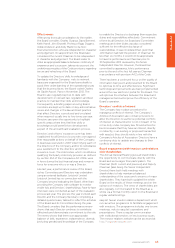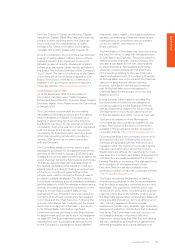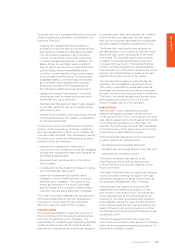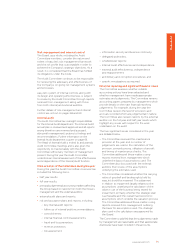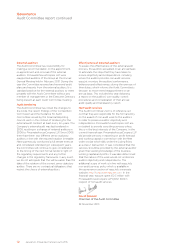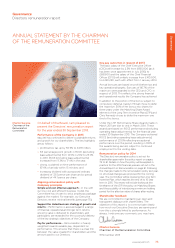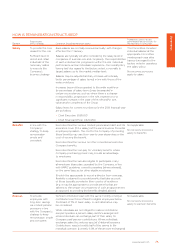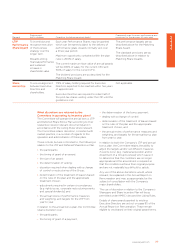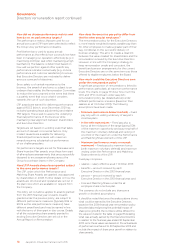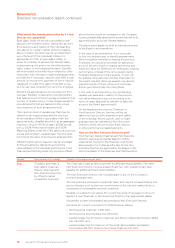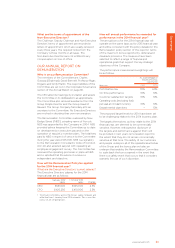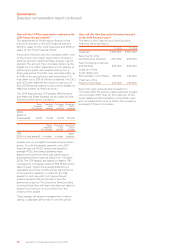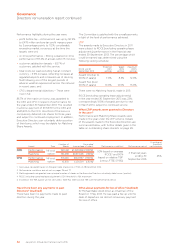EasyJet 2013 Annual Report Download - page 76
Download and view the complete annual report
Please find page 76 of the 2013 EasyJet annual report below. You can navigate through the pages in the report by either clicking on the pages listed below, or by using the keyword search tool below to find specific information within the annual report.
easyJet plc Annual report and accounts 2013
74
WHAT IS IN THIS REPORT?
This report sets out details of the remuneration
policy for Executive and Non-Executive Directors,
describes the implementation of that policy and
discloses the amounts paid relating to the year
ended 30 September 2013.
The report complies with the provisions of
the Companies Act 2006 and Schedule 8 of
The Large and Medium-sized Companies and
Groups (Accounts and Reports) (Amendment)
Regulations 2013. The report has been prepared
in line with the recommendations of the
UK Corporate Governance Code and the
requirements of the UKLA Listing Rules.
The Directors’ remuneration policy (set out
on pages 74 to 81) will be put to shareholders
for approval in a binding vote at the AGM. The
effective date of the policy is 13 February 2014
which is the date shareholder approval is being
sought for the policy for the first time under the
new reporting rules. The policy remains consistent
with that operated during the 2013 financial
year and approved at the 2013 AGM under
the previous reporting framework, following
extensive consultation with shareholders.
The Annual Statement by the Chairman of the
Remuneration Committee (set out on page 73)
and the Annual Report on Remuneration (set out
on pages 81 to 88) will be subject to an advisory
vote at the AGM.
OUR REMUNERATION POLICY
What is the role of our Remuneration
Committee?
The Remuneration Committee has responsibility
for determining remuneration for the Executive
Directors and the Chairman. The Committee also
reviews the remuneration of the Company’s most
senior executives in consultation with the CEO. The
Committee takes into account the need to recruit
and retain executives and ensure that they are
properly motivated to perform in the interests of
the Company and its shareholders, while paying
no more than is necessary.
What does the Committee consider when
setting remuneration?
When setting the policy for Executive Directors’
remuneration, the Committee takes into account
total remuneration levels operating in companies
of a similar size and complexity, the responsibilities
of each individual role, individual performance and
an individual’s experience. Our overall policy, having
had due regard to the factors noted, is to weight
remuneration towards variable pay. This is typically
achieved through setting base pay up to market
median levels, offering very modest pension and
benefits and above market variable pay opportunity
linked to the achievement of very demanding
performance targets.
In setting remuneration for the Executive Directors,
the Committee does take note of the overall
approach to reward for employees in the Group and
salaries increases will ordinarily be (in percentage of
salary terms) in line with those of the wider workforce.
The Committee does not formally consult directly
with employees on executive pay but does receive
periodic updates from the Group People Director.
The Committee also considers developments in
institutional investors’ best practice expectations
and the views expressed by shareholders during
any dialogue.
How do you take into account the views
of shareholders when you determine the
remuneration policy?
We remain committed to shareholder dialogue
and take an active interest in voting outcomes.
We consult extensively with our major shareholders
when setting our remuneration policy. If any of these
shareholders are opposed to our policy, we would
endeavour to meet with them, as appropriate,
to understand and respond to any issues they
mayhave.
Governance
Directors’ remuneration report continued


